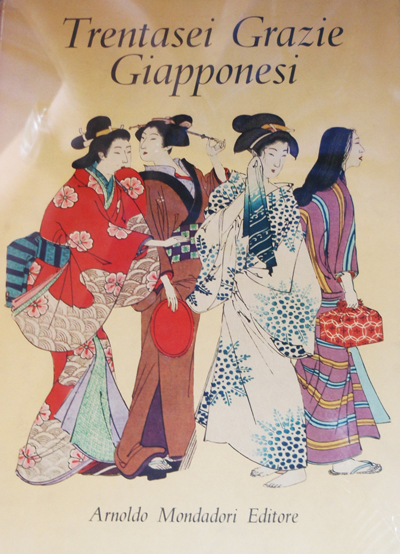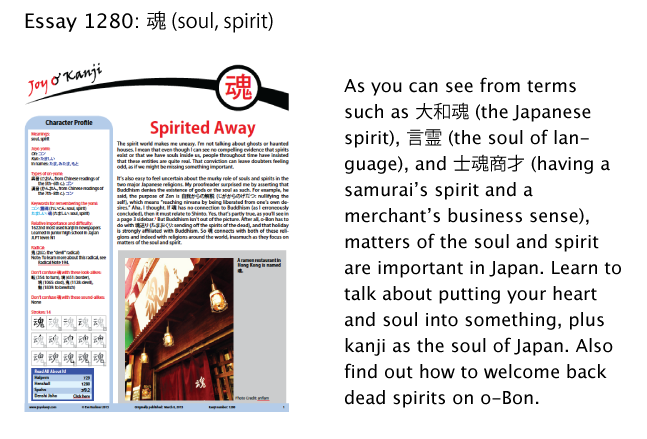Untying the Kimono
Last week at the farmers' market, I asked for six eggs. The woman stared at me as if nothing were sinking in, but because she remained silent, I couldn't really clarify. She then disappeared into the vendor's van for awhile, and the next thing I knew, a man told me I owed $30.
I said, "Thirty?! It should be three!" I noticed then that the woman had retrieved six cartons of eggs.
Realizing what had gone wrong, I said, "I wanted 6 eggs, not 6 cartons."
By then all three vendors at the stand were staring at me blankly. Finally two of them said at once, "A half dozen!"
I think they were correcting me. Have they never heard the expression "Six of one, a half dozen of the other"?
I mention this because I've come across a great Japanese idiom that somehow reminds me of that experience:
帯に短し襷に長し
good for neither one thing nor the other
帯 (おび: band, sash); 短し (みじかし: short);
襷 (たすき: cord used to tuck away kimono sleeves
that are in the way); 長し (ながし: long)
The しs are archaic endings for what have become -い adjectives today.
By the way, 襷 is a non-Joyo kokuji (a character made in Japan). What a crazy concoction it is, too! To understand how the Japanese use this sort of cord to tuck away long kimono sleeves, you can watch an unnarrated, strangely out-of-focus video of an unattractive man or a video of a lovely young woman narrated in well-enunciated, slow Japanese. Which one did you choose?!

Photo Credit: Eve Kushner
In Verona, Italy, I spotted this book in the window of a bookstore. The title translates as Thirty-Six Graceful Japanese. I'm not sure why there are just four women on the cover!
Let's return to 帯に短し襷に長し. This saying literally refers to a cord that's too short to use as a sash around the waist but too long to use as a 襷. Metaphorically, it refers to something that's useless in all respects.
In addition to leading off this vivid expression, 帯 plays a part in several others. This kanji is ripe with figurative possibilities. I suppose that's somewhat true in English with "belt," which gives us "asteroid belt" and "hitting below the belt." However, I associate belt metaphors most strongly with the Beltway, a freeway encircling Washington, D.C., and then with two places just outside it: Beltsville and Greenbelt. Growing up an hour away in Annapolis, I would hear those names on radio stations and feel as if I were choking to death on suburban dullness.
Wait, that just goes to show how much I know. It turns out that Beltsville dates back to 1649 and was named for tobacco farmer Trueman Belt, not for the Beltway, as I assumed! In fact, as Beltsville began to burgeon in the 19th century, it eclipsed the nearby town of Vansville in importance!
Vansville?! Gack!
My apologies if you happen to live in any of these places. I'm sure they're lovely.
I seem to have taken a detour. I wanted to say that 帯 gives rise to several fun idioms. Take, for instance, this one:
帯を緩くする (おびをゆるくする: to relax; be rid of anxiety) kimono sash + to loosen
If you loosen your kimono sash, you can relax. Here's another 帯 expression:
帯を解く (おびをとく: to have sex; relax) kimono sash + to untie
Once you untie the kimono sash, any number of things can happen.
All of this is very Japanese, of course, given the origins of the kimono. But another 帯 idiom is actually a yojijukugo (a term explained in the last section of the glossary), so it's from China:
一衣帯水 (いちいたいすい: separated by a river or sea as narrow as a kimono sash)
1 + kimono sash (middle 2 kanji) + water
The Japanese often use this expression for neighboring China and Korea, but one can apply it to other countries, as well:
イギリス人にとって、フランス人は一衣帯水の隣人だ。
For the British, the French are neighbors just across the English Channel.
-人 (-じん: suffix denoting nationality); 隣人 (りんじん: neighbors)
There are many things to love about the term 一衣帯水. Here are three:
1. It takes a liquid and reimagines it as a solid thing, a sash. What a transformation! Because the expression alludes to a waterway between countries as a mere strip of fabric, the world seems like a smaller, cozier place. Whereas waterways separate, often in a harsh way (e.g., strong currents, unfathomable depths, frightening sea creatures, and the like), 一衣帯水 makes me think that it's possible to walk from England to France on a soft sash! One might even sashay there!
2. The word 一衣帯水 (いちいたいすい) employs the on-yomi of タイ for 帯. That sounds like exactly what one does with a kimono sash—one ties it!
3. In the yomi of 一衣帯水 we see a lovely hiragana array. Here it is enlarged:
いちいたいすい
What choreography! What beautiful symmetry! Each い is like a thin ribbon between other hiragana, making this word unintentionally pictographic.
Speaking of shapes, we find a stunner in the kanji of the week, 魂. I adore the way it has two noses, so to speak. I'm referring to the repeating ム shapes, which congregated in 魂 as a fluke. I call them noses because the ム component often means "nose," coming from the practice in some Asian countries of pointing to the nose to refer to oneself. It doesn't mean that in 魂 either time. Essay 1280 explains the etymology. Here's a sneak preview:

Have a great weekend!

Comments